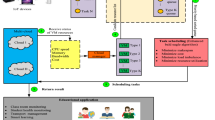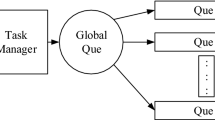Abstract
Some of the conventional approaches to task scheduling are discussed in this section. The scheduling of tasks in the Internet of Things (IoT) application is a complex job in cloud computing due to the heterogeneity characteristics of the IoT. Therefore, an efficient scheduling approach is vital in improving the performance of the Cloud-IoT applications. The improvement in QoS mainly depends on efficient task scheduling and allocating the task to the appropriate Virtual Machine (VM). This paper uses a clustering-based approach to design an optimal solution for task scheduling and VM allocation for IoT applications in education services. The workflow is simplified with horizontal and vertical clustering, and VM is allocated. The task is classified into coarse and fine-grained, based on the average execution time of the total number of tasks. The average execution time is calculated based on the best and worst performance of VM. The vertical clustering approach clusters the tasks into sequential and parallel, thereby turning the huge volume of tasks into simple ones. The horizontal clustering approach selects the VM with the help of a bipartite matching graph which enhances the Quality of Service (QoS). The proposed task clustering has been evaluated in metrics like makespan, response time, throughput, total execution time, task completion time, and VM utilization. The proposed approach achieved a makespan of 2500 ms and throughput of 83 Mbps for 100 tasks, a response time of 0.12 ms, a total execution time of 640 ms, and a total task completion time of 340,000 ms for a 2 arrival rate based on performance evaluation results.













Similar content being viewed by others
References
Abualigah L, Alkhrabsheh M (2022) Amended hybrid multi-verse optimizer with genetic algorithm for solving task scheduling problem in cloud computing. J Supercomput 78(1):740–765
Aburukba RO, AliKarrar M, Landolsi T, El-Fakih K (2020) Scheduling Internet of Things requests to minimize latency in hybrid Fog–Cloud Computing. Futur Gener Comput Syst 111:539–551
Alla HB, Alla SB, Touhafi A, Ezzati A (2018) A novel task scheduling approach based on dynamic queues and hybrid meta-heuristic algorithms for cloud computing environment. Clust Comput 21(4):1797–1820
Amarante SRM, Roberto FM, Cardoso AR, Celestino J (2013) Using the multiple knapsack problem to model the problem of virtual machine allocation in cloud computing, In 2013 IEEE 16th International Conference on Computational Science and Engineering (pp, 476–483), IEEE
Basu S, Karuppiah M, Selvakumar K, Li KC, Islam SH, Hassan MM, Bhuiyan MZA (2018) An intelligent/cognitive model of task scheduling for IoT applications in cloud computing environment. Futur Gener Comput Syst 88:254–261
Boveiri HR, Khayami R, Elhoseny M, Gunasekaran M (2019) An efficient Swarm-Intelligence approach for task scheduling in cloud-based internet of things applications. J Ambient Intell Humaniz Comput 10(9):3469–3479
Ding D, Fan X, Zhao Y, Kang K, Yin Q, Zeng J (2020) Q-learning based dynamic task scheduling for energy-efficient cloud computing. Futur Gener Comput Syst 108:361–371
Dong M, Fan L, Jing C (2019) ECOS: An efficient task-clustering based cost-effective aware scheduling algorithm for scientific workflows execution on heterogeneous cloud systems. J Syst Softw 158:110405
Gad-Elrab AA, Noaman AY (2020) A two-tier bipartite graph task allocation approach based on fuzzy clustering in cloud–fog environment. Futur Gener Comput Syst 103:79–90
Gaur A, Scotney B, Parr G, McClean S (2015) Smart city architecture and its applications based on IoT. Proc Comput Sci 52:1089–1094
Iranmanesh A, Naji HR (2020) DCHG-TS: a deadline-constrained and cost-effective hybrid genetic algorithm for scientific workflow scheduling in cloud computing. Cluster Comput 1–15
Jing W, Zhao C, Miao Q, Song H, Chen G (2021) QoS-DPSO: QoS-aware Task Scheduling for Cloud Computing System. J Netw Syst Manage 29(1):1–29
Lee I, Lee K (2015) The Internet of Things (IoT): Applications investments and challenges for enterprises. Bus Horiz 58(4):431–440
Ma X, Gao H, Xu H (2019) Bian M (2019) An IoT-based task scheduling optimization scheme considering the deadline and cost-aware scientific workflow for cloud computing. EURASIP J Wirel Commun Netw 1:1–19
Medara R, Singh RS (2021) Energy efficient and reliability aware workflow task scheduling in cloud environment. Wirel Pers Commun 119(2):1301–1320
Pan J, McElhannon J (2017) Future edge cloud and edge computing for internet of things applications. IEEE Internet Things J 5(1):439–449
Pandiyan S, Lawrence TS, Sathiyamoorthi V, Ramasamy M, Xia Q, Guo Y (2020) A performance-aware dynamic scheduling algorithm for cloud-based IoT applications. Comput Commun 160:512–520
Rafieyan E, Khorsand R, Ramezanpour M (2020) An adaptive scheduling approach based on integrated best-worst and VIKOR for cloud computing. Comput Ind Eng 140:106272
Rjoub G, Bentahar J, Wahab OA (2020) BigTrustScheduling: Trust-aware big data task scheduling approach in cloud computing environments. Futur Gener Comput Syst 110:1079–1097
Saeedi S, Khorsand R, Bidgoli SG, Ramezanpour M (2020) Improved many-objective particle swarm optimization algorithm for scientific workflow scheduling in cloud computing. Comput Ind Eng 147:106649
Shadroo S, Rahmani AM, Rezaee A (2021) The two-phase scheduling based on deep learning in the Internet of Things. Comput Netw 185:107684
SP (n.d.) Analyst Iot platforms : enabling the internet of things 20
Sreenu K, Sreelatha M (2019) W-Scheduler: whale optimization for task scheduling in cloud computing. Clust Comput 22(1):1087–1098
Stavrinides GL, Karatza HD (2019) A hybrid approach to scheduling real-time IoT workflows in fog and cloud environments. Multim Tools Appl 78(17):24639–24655
Tian Q, Li J, Xue D, Wu W, Wang J, Chen L, Wang J (2020) A hybrid task scheduling algorithm based on task clustering. Mob Netw Appl 25(4):1518–1527
Topcuoglu H, Hariri S, Wu MY (2002) Performance-effective and low-complexity task scheduling for heterogeneous computing. IEEE Trans Parallel Distrib Syst 13(3):260–274
Zhou Z, Wang H, Shao H, Dong L, Yu J (2020) A high-performance scheduling algorithm using greedy strategy toward quality of service in the cloud environments. Peer-to-Peer Netw Appl 13(6):2214–2223
Author information
Authors and Affiliations
Contributions
All the authors have participated in writing the manuscript and have revised the final version. All authors contributed to the study conception and design. Material preparation, data collection and analysis were performed by Sunil Kumar Chowdhary, A L N Rao. The first draft of the manuscript was written by Sunil Kumar Chowdhary and all authors commented on previous versions of the manuscript. All authors read and approved the final manuscript. Conceptualization: Sunil Kumar Chowdhary; Methodology: Sunil Kumar Chowdhary, A L N Rao; Formal analysis and investigation: A L N Rao; Writing - original draft preparation: Sunil Kumar Chowdhary; Writing - review and editing: Sunil Kumar Chowdhary, A L N Rao; Supervision: A L N Rao.
Corresponding author
Ethics declarations
Ethical approval
This article does not contain any studies with human participants and/or animals performed by any of the authors.
Informed consent
There is no informed consent for this study.
Conflict of interest
Authors declares that they have no conflict of interest.
Additional information
Publisher's note
Springer Nature remains neutral with regard to jurisdictional claims in published maps and institutional affiliations.
Rights and permissions
Springer Nature or its licensor (e.g. a society or other partner) holds exclusive rights to this article under a publishing agreement with the author(s) or other rightsholder(s); author self-archiving of the accepted manuscript version of this article is solely governed by the terms of such publishing agreement and applicable law.
About this article
Cite this article
Chowdhary, S.K., Rao, A.L.N. A task clustering based QoS aware scheduling algorithm for task execution in cloud-Iot model for education services. Multimed Tools Appl 82, 44783–44800 (2023). https://doi.org/10.1007/s11042-023-15392-z
Received:
Revised:
Accepted:
Published:
Issue Date:
DOI: https://doi.org/10.1007/s11042-023-15392-z




